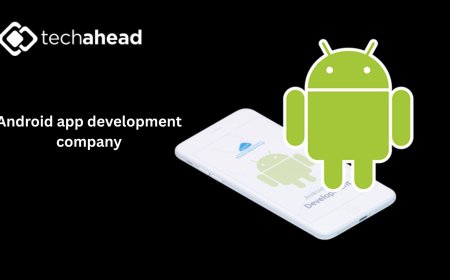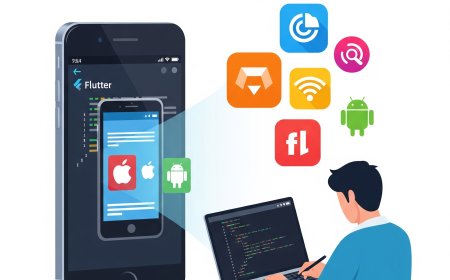Can Python Be Used for Blockchain Development?
Explore how blockchain development with Python works, the tools available, and why use Python for creating secure and scalable blockchain apps.

As the blockchain ecosystem continues to expand in 2025, developers and enterprises are exploring programming languages that offer efficiency, scalability, and ease of use. A common question among developers today is: can Python be used for blockchain development?
The short answer is yes. Python is a powerful, readable, and flexible language well-suited for many blockchain-related tasks. Whether you're developing smart contracts, building secure wallets, or testing decentralized applications (dApps), blockchain development with Python offers several practical advantages. So, why use Python for blockchain? Because it streamlines development, shortens learning curves, and integrates seamlessly with other technologies.
The Role of Python in Blockchain Projects
Blockchain is no longer exclusive to cryptocurrency. It's being used across industries like supply chain, finance, logistics, healthcare, and cybersecurity. In this evolving environment, the need for rapid prototyping, strong cryptography, and efficient networking is crucial.
Python meets all these requirements. Its syntax is clean, libraries are extensive, and developer tools are abundant. Thats why blockchain development with Python has become more common, especially for startups, research teams, and enterprises entering Web3.
Benefits of Blockchain Development with Python
Here are some key reasons why Python is a preferred language in blockchain projects:
-
Ease of Learning: Python is beginner-friendly and ideal for teams working on blockchain MVPs or proofs-of-concept.
-
Rapid Prototyping: Developers can build and test blockchain features faster with Pythons concise syntax.
-
Robust Libraries: Python has built-in modules for cryptography, hashing, and network communicationscore elements of blockchain systems.
-
Cross-Platform Support: Python applications can run across all major platforms, ensuring seamless deployment of blockchain nodes or tools.
-
Integration-Ready: Python works well with REST APIs, databases, and cloud services, often needed in modern blockchain use cases.
These advantages explain why blockchain development with Python is gaining traction among both new and experienced developers.
Leading Python Blockchain Frameworks
One of Pythons biggest strengths is its rich ecosystem of libraries and frameworks. When it comes to blockchain, several Python blockchain frameworks simplify development and testing.
Notable frameworks include:
-
web3.py: Enables interaction with Ethereum networks using Python scripts. Its essential for writing Python clients for Ethereum smart contracts.
-
PyCryptodome: A low-level library for cryptographic operations like encryption, hashing, and key generation.
-
Vyper: A smart contract language similar to Solidity but written with Python-like syntax, designed for Ethereum Virtual Machine (EVM) compatibility.
-
Brownie: A full-featured framework for smart contract development that supports testing, deployment, and integration.
These Python blockchain frameworks offer strong foundations for building secure and functional decentralized systems.
Real-World Applications of Python in Blockchain
There are many real-world use cases where blockchain development with Python is effectively applied:
-
Secure Digital Wallets: Create custom wallets for cryptocurrency transactions using Python's cryptography modules.
-
Private Blockchains: Build lightweight blockchain prototypes for internal enterprise use.
-
Voting Platforms: Python allows developers to build tamper-proof digital voting systems with transparency and auditability.
-
Smart Contracts: Although Solidity dominates Ethereum smart contract development, tools like Vyper enable Python developers to write EVM-compatible contracts.
-
Tokenization Platforms: Python can be used to build backend systems for token generation and management.
These applications demonstrate Pythons ability to support both early-stage and production-ready blockchain systems.
Is Python the Best Language for Blockchain?
While Python is not the only option available, many developers consider it among the best language for blockchain when it comes to speed, flexibility, and productivity. Languages like Go, Solidity, and Rust offer performance advantages for specific blockchain platforms, but Python shines in terms of developer efficiency, ease of testing, and integration.
Its compatibility with modern data platforms and AI tools also makes it a valuable asset in blockchain projects that require analytics or automation capabilities.
Python Development Services for Blockchain
Companies that want to build or scale blockchain solutions often turn to specialized Python Development Services. These service providers assist with:
-
Designing blockchain architecture
-
Developing and auditing smart contracts
-
Building APIs to connect blockchain with traditional systems
-
Ensuring security and compliance across platforms
By working with professionals, businesses can accelerate blockchain development with Python and reduce time-to-market for their Web3 products.
Conclusion: Why Use Python for Blockchain in 2025?
To wrap up, can Python be used for blockchain development? Absolutely. It provides a flexible and productive environment to build decentralized systems, from smart contracts to secure APIs and enterprise blockchains.
The question of why use Python in blockchain development is more relevant than ever. It reduces complexity, supports rapid deployment, and integrates well with modern technologies. As more industries experiment with blockchain, Python will continue to be a valuable tool in the developer toolkit.
Whether you're building a prototype or a full-scale blockchain application, blockchain development with Python offers the clarity, efficiency, and support needed to succeed.








































